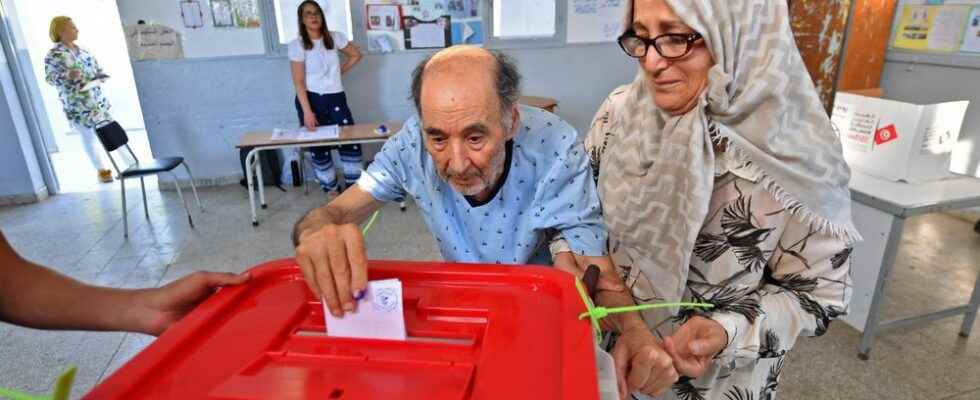More than a decade after the Arab Spring, of which it was the cradle, Tunisia could return to an authoritarian regime. Its 9.3 million voters are called on Monday, July 25 to vote for the new Constitution proposed to them by President Kaïs Saïed, the objective of which is to considerably strengthen his prerogatives. The results are expected in the coming days. Interview with political scientist Khadija Mohsen-Finan, author of Tunisia, learning about democracypublished in 2021 by New World editions.
L’Express: How is this new Constitution controversial?
Khadija Mohsen-Finan: It is controversial on two aspects. The first concerns the process. There was no real consultation on the possibility of rewriting the previous Constitution, voted by a very large majority in 2014 by the representatives of the people. While some felt that it could be changed, its rewriting was not seen as a necessity that could meet the urgent needs of Tunisians. At the beginning of 2022, there was a first consultation to change it, electronic, but only 500,000 people answered the call, a ridiculous figure compared to the 9 million voters. Despite this, the president set up a commission. She made him a plan… which he shunned. And he offered ultimately its own constitution.
The second aspect concerns the substance of this Constitution. It takes the Tunisians out of the parliamentary system, with, of course, a Head of State already elected by universal suffrage, but in which the representatives of the people, the Parliament, have their say. There, we are moving towards a strong, tailor-made presidential regime, designed by a man and for himself. The Head of State will concentrate all the powers, will be able to act by decrees which will not be subject to any authority, while calling into question the independence of justice. Added to this is the fact that the civilian character of the state is disappearing. The 2014 constitution placed the law above religion and tradition, this is no longer the case. This constitution makes us fall towards authoritarianism, not to speak of dictatorship. We are heading into the unknown.
The “yes” goes favorite. Will his potential victory give full legitimacy to this new Constitution?
The “yes” will win, that’s obvious. Tunisians feel they have tried everything: parties, democracy, and are ready to support a man from the people, who talks about the people and looks like them. Especially since he based his argument on the fact that the supporters of the “no” vote are members of an elite who want to maintain their privileges against the people, or are favorable to the Islamist party Ennahdha. He presented the Constitution of 2014, yet the fruit of a political compromise, like that of the Ennahdha party, which is false. As for participation, Kaïs Saïed will not take it into account.
Tunisians vote during the referendum for a new constitution, in Tunis, on July 25, 2022.
afp.com/FETHI BELAID
Kaïs Saïed claims to be of the former leader Habib Bourguiba, father of independence. What brings them together and distinguishes them?
They are both lawyers. Saïed is a professor of constitutional law. Bourguiba was a lawyer. And Saïed wants to be a bulwark against political Islam, which Bourguiba also rejected. But Saïed is an Arab nationalist, turned towards the East, and denounces Western plots hindering the development of Tunisia. Bourguiba was turned towards the West and its values with development as a priority for the population, well before, it is true, any political opening. When Saïed claims Bourguiba, there is deception.
Tunisia is going through a serious economic crisis. What does Saïed envisage as reforms in the wake of this new Constitution?
There are not any. He is content to say that Tunisia is a rich and despoiled country. He adds that thanks to this new Constitution, he will straighten out the public accounts by recovering and redistributing the money from corruption. However, we know that even if he managed to recover these sums, it would not pay the country’s debt, nor would it meet its needs.
Can Tunisia experience demonstrations like those of 2010-2011, causing the fall of the Ben Ali regime?
A revolution does not repeat itself at intervals of 10 years, but there can be very important demonstrations caused by the social and economic situation of people, whose purchasing power is more and more limited. Already weakened by the covid crisis, Tunisia buys half of its wheat from Ukraine, so we expect a difficult return. The deterioration of living conditions could lead to an uprising. But Kaïs Saïed will tell people that he did not achieve his ends because of a plot hatched abroad or, internally, by the elites.
People will only ask for his departure when they associate the deterioration of their living conditions with the President, whom they consider above all a man of integrity and uncorrupted… for the moment.
Interview by Clément Daniez
